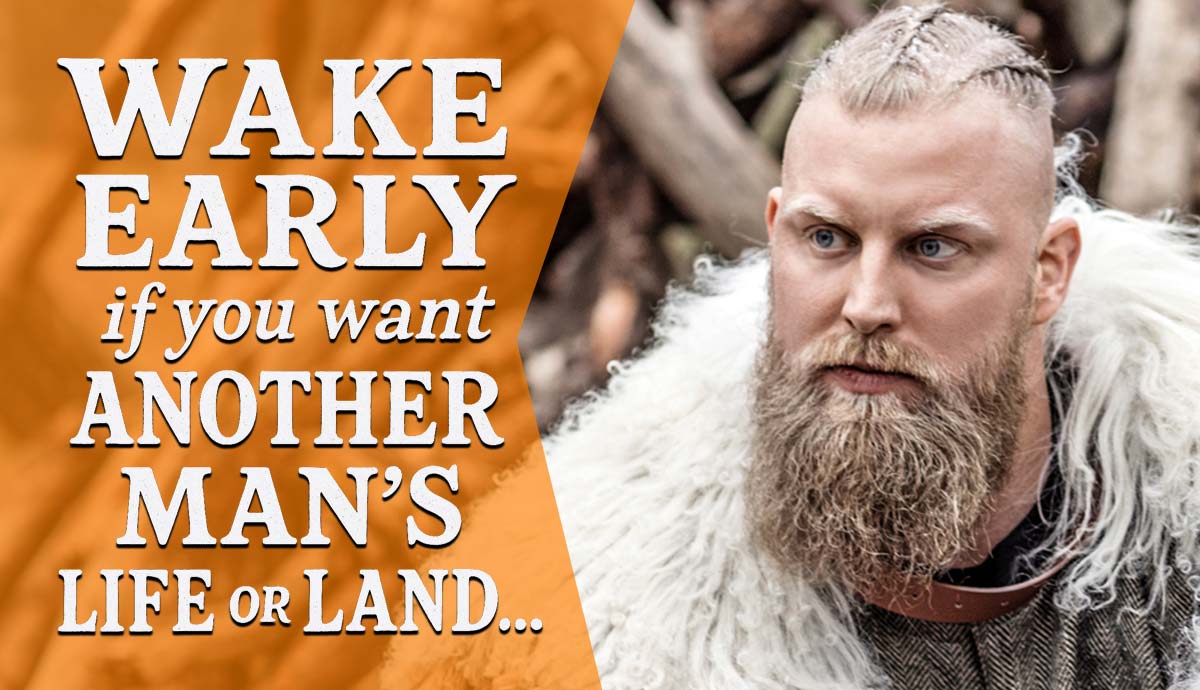8 Viking Sayings that Turned Hardship into Strength
The Vikings lived in harsh, unforgiving northern Scandinavian lands. The Viking cultures of Sweden, Denmark, and Norway developed a strong but unforgiving culture. Common aspects to all three included rugged terrain, extended winters, and volatile seas. To survive, raiding became a primary source of survival along with trading or emigration. The Vikings soon developed a warrior ethos, brutality and endurance. Hardships were commonplace. Loyalty and fearlessness were prized, with death in combat seen as a worthy path to Valhalla. In the face of all this, the Vikings created these sayings to teach and educate. Hardship shouldnt be feared but prevailed over.Sayings Embracing Action Over EvasionViking runic stone.1. Wake early if you want another mans life or land. No lamb for the lazy wolf. No battles won in bedThe Vikings could never be described as passive; a warrior ethos shaped their society. Raiding was a rite of passage. Given that, the sayings meaning tells the listener to rise with purpose. The early riser gets out raiding or defends territory before others are up. One must act before others do.2. Fight your foes in the field, nor be burnt in your houseA saying from the Icelandic tale The Volsunga Saga, this motto tells the warrior to fight.Not to stand but to confront the enemy head-on. Hiding is cowardice and dishonorable. And to a Viking, dying without fighting is the ultimate disgrace.Sayings that Challenge Fear and FateThe Norns, from Asgard Stories: Tales from Norse Mythology, by Mary Foster and Mabel Cummings, 1901, Source: My Norse Digital Image RepositoryFor the Vikings, fate became fixed and unescapable. As with other cultures, their mythology and literature reflected this. For the warrior, he must accept his wyrd (fate).3. Fear not death, for the hour of your doom is set and none may escape itThis saying shows that ones fate is predetermined. The Norns, three Norse deities who determined a persons fate, spun a Vikings fate. What mattered in this life is how the warrior met that end. The warrior must choose to meet it with honor.4. None but a coward dares to boast that he has never known fearIn a culture that values courage, boasting about being fearless is bravado. Even Odin feared Ragnarok, but prepared for this final battle.Those of Forging Resilience and ResolveNorse hero Sigurd killing Fafnir from the door panels of the Hylestad stave church, now at the Historisk Museum, Oslo, Norway. Source: Wikimedia CommonsWhile swords are critical in any fight, courage and resolve matter more. Its just not the hand wielding the weapon.5. The brave man well shall fight and win, though dull his blade may be6. When men meet foes in fight, better is stout heart than sharp swordQuoted from the Viking poem Fafnismal, this saying suggests that sharp swords are crucial in a conflict. Yet the warriors blade must be matched by their resolve. A fine wielded by a coward is just that-a nice weapon. Even Odin prized wisdom and valor over sheer force to earn their reward.7. Bravery is Half the VictoryThis saying, sourced from the Havamal, a collection of traditional poems attributed to Odin, means that bravery is more than a virtue. Before any fight, a Norse warriors bravery should be without question. Conquering fear killed the warriors worst enemy.The Value of Legacy and ReputationOdin fighting the Fenris Wolf. Source: World History EncylopediaThe Vikings prized reputation highly. Victorious warriors in heroic tales echoed through time like Sigurd defeating a dragon. Scandinavian society equally prized legacy and honor. Their reputation and actions affected their kin (family) too. Personal and family legacy mattered, and deviations could mean exile or worse. Many of their sayings took on these issues, teaching their ethics.8. Cattle die, kinsmen die, all men are mortal. Words of praise will never perish, nor a noble nameThe quotes definition is layered. Found in the Havamal (quotes attributed to Odin), the first comments on cattle dying. Cattle to Vikings symbolized wealth. Yet all possessions are temporary. The rest states that death is unavoidable, even for the Norse gods. For all, the final battle of Ragnarok looms.Finally, the last line displays the rich Viking oral tradition: great deeds and noble names will live on through praise. The Viking sayings quoted here show that hardship is unavoidable. What mattered was how the person responded by using bold actions, a sharp sword, and resilience.A Visual RepresentationA Wintry Arctic Fjord. Source: PXHereThe Vikings reflected these in their runes, typically inscribed on materials such as stone or metal. The eiwaz rune, or yew tree, represented resilience and endurance in the face of adversity. Eiwaz represents the ability to be stronger after strife. The Vikings shared these sayings through an oral tradition. These vehicles include tales, proverbs, and poetry (sagas). Much later, these sayings would be written down.


